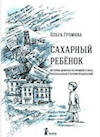
Sugar Kid: A Story of the Girl from the Last Century
Told by Stella Nudolskaya
Written by Olga Gramova
Illustrated by Maria Pasternak
KompasGuide, 2014, 160 pp.
ISBN-13: 978-5000830673
Sugar Kid is a compelling and truthful story about a child growing up during the Stalin era. It is not a memoir; it is rather memories of childhood told many years later to a friend. Olga Gromova, the chief editor of a journal for school librarians, retells the true story of Stella Nudolskaya whose real name was Stella Dubrova. Stella was an engineer and a science teacher; during Perestroika she was an active member of Memorial, an organization which preserved the memory of those who were arrested under Stalin. Stella is the narrator and a main character of the book. While this is a story of her life, she was not able to write it herself, and asked her younger friend Olga Gromova to help. In effect, it is a true story of a girl whose life was shaped by political events when she was only 4 years old.
Stella, who is called Elli by her parents, grew up in a wonderful family with a loving father and mother. They taught her several languages and read poetry to her. The girl loved fairy tales, legends, and history, from King Arthur and the Knights of the Round Table to the Medieval Russian Princes and Joan of Arc. When she was still very young, her father was arrested and sent to a labor camp. It was the time of Stalin’s “Great Purge” when many innocent people were arrested and killed. Soon little Elli and her mother were sent to exile. Elli’s nanny helped them to pack their winter clothing and other necessities; almost everything was lost during the long journey.
The mother and daughter went to Kirgizia (now Kyrgyzstan) in Central Asia. It was a place with severe climate of extremely hot and extremely cold weather. First, they were sent to the women’s labor camp for the family members of the “enemies of the state.” They slept on the ground under the open skies, and Stella’s mother was forced to work in very harsh conditions. Even in the camp, Elli never forgets about her dream of freedom. She, a small child, was beaten several times by the guards for getting too close to the barb wire which surrounded the camp. She wanted to look at the flowers outside. After being released from the camp, Ellie’s mother could not find a job, and they almost died from starvation and cold. A local family, at great risk to themselves, took them into their home.
Later, they settled for a while in a small village in rural Kirgizia. Eventually, Elli’s mother found a job and Elli was able to go to school again. She made new friends, and it almost looked as though she could once again have a happy childhood. But Elli always needed to remember that one careless word could get her mother fired or even arrested. And indeed, her mother was fired from her position as a school teacher for a “lack of patriotic education during the science lessons.”
It was very difficult for them to survive in this new environment, but many people were kind to them. Some local Kirgiz families helped them with food and clothing. Elli’s mother also always helped people around her. She read loudly to them because many were illiterate. She wrote letters for them. She was a very strong person who always tried to console her daughter when she was scared. She recited wonderful poetry and sang beautiful songs to her.
A lot of people were exiled from Ukraine and sent to Kirgizia, and both mother and daughter learned two new languages, Ukrainian and Kirgiz, because they believed that it is important to know the language of people around them. Elli was a blond girl, which was unusual in these places. She was loved by everyone, and got the nickname Sugar Kid, “Kant Bala” in Kirgiz language. The danger of losing a job or even being again arrested was always there. The mother and daughter were able to return back to Moscow only after Stalin’s death, and Elli’s father never returned from the camp.
Eugene Yelchin’s book Breaking Stalin’s Nose (2013) can be recommended as further reading about the children of parents arrested during the Stalin era. Another book describing an experience similar to Elli’s is Esther Hautzig’s The Endless Steppe: Growing Up in Siberia (1995). Books about children’s suffering under the Nazi regime, such as Devil’s Arithmetic by Jane Yolen (2004) and Anita Lobel’s No Pretty Pictures: A Child of War (2008), are also recommended.
Olga Bukhina, International Association for the Humanities, New York, NY
WOW Review, Volume VII, Issue 1 by Worlds of Words is licensed under a Creative Commons Attribution-NonCommercial-ShareAlike 4.0 International License. Based on work at https://wowlit.org/on-line-publications/review/vii-1/
